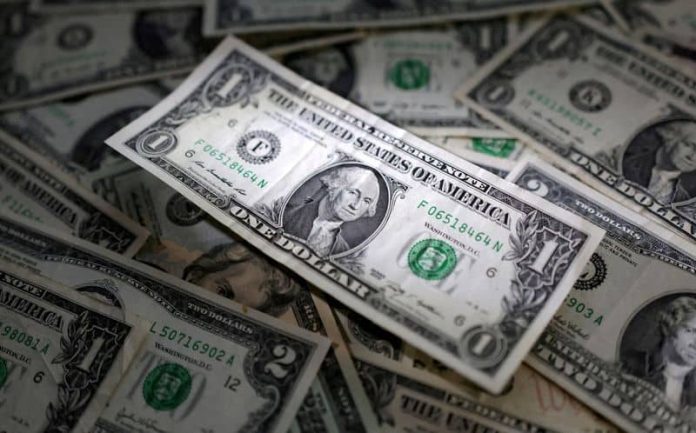凯文·巴克兰
TOKYO (Reuters) – The U.S. dollar on Wednesday clawed back some of the previous session’s sharp declines as investors looked ahead to more labour market data for clues on the path for Federal Reserve policy.
The dollar index – which measures the currency against six major peers including the yen and euro – added 0.09% to 103.64 as of the Asian afternoon.
On Tuesday, the index had slumped 0.39% for its worst day in a month and a half, after a slide in JOLTS job openings to a 2-1/2 year low spurred traders to pare bets for further U.S. rate hikes.
“With traders now sensitive to weaker U.S. data in hopes of the Fed’s peak rate, I’d expect USD bears to pounce on the back of any data which backs up the JOLTS jobs report,” said Matt Simpson, a market analysts at City Index.
“Whilst this brings excitement that yields and the U.S. dollar have topped, we’d warrant some caution given it was in response to second-tier employment data, and there is plenty of more data to come out this week,” culminating in Friday’s monthly non-farm payrolls report, Simpson added.
The two-year U.S. Treasury yield, which is most sensitive to expectations for Fed policy, slumped as much as 18 basis points (bps) to 4.871% on Tuesday, before recovering to around 4.91% in Asian trading hours.
The 10-year yield edged off Tuesday’s low of 4.106%, a level last seen on Aug. 11, to stand at 4.1354%.
The dollar rose 0.23% to 146.205 yen. On Tuesday, it had surged to a 10-month peak at 147.375 leading into the JOLTS report, only to end the day with a 0.45% decline.
Levels this high spurred the first yen buying intervention by Japanese officials in a generation last autumn.
Bank of Japan board member Naoki Tamura reiterated on Wednesday that the central bank is watching closely the effects on the economy of a weak yen when conducting policy.
The euro edged down 0.18% to $1.0860 after rallying 0.56% overnight.
Money market traders currently place 86.5% odds for the Fed to keep rates steady on Sept. 20, although the odds for a hike at the following meeting in November are close to 50/50.
Investors had raised hawkish Fed bets recently amid a spate of resilient data. Fed Chair Jerome Powell said on Friday that further tightening may be needed to cool still-too-high inflation, but also promised to move with care.
Meanwhile, Australian inflation slowed to a 17-month low in July, reinforcing the case for the Reserve Bank of Australia to hold rates steady at its policy meeting next week.
The Aussie dollar dipped as much as 0.46% after the data but eventually shook the data off to trade little changed at $0.64775.
The Chinese yuan weakened slightly in offshore trading to 7.3002 per dollar, but remained well above the Aug. 17 low of 7.3490.
The People’s Bank of China set the official mid-point for onshore trading at 7.1816, around 1,000 pips firmer than the Reuters estimate, something it has done every day since the middle of the month.
Elsewhere, bitcoin eased 0.94% to $27,465, after surging more than $2,000 in the previous session to hit a nearly two-week top at $28,142.
The world’s leading cryptocurrency was bought aggressively following a court ruling that could pave the way for a first-of-its-kind spot bitcoin exchange traded fund.
In the week and a half prior to that, it had been treading water around $26,000.
“There is still work needed to get a full green light to roll out a spot ETF, but we’re certainly a step closer,” Chris Weston, head of research at Pepperstone, wrote in a client note, adding the price could head to $29,200.
“Shorts will be concerned with holding exposures ahead of further news flow.”



















